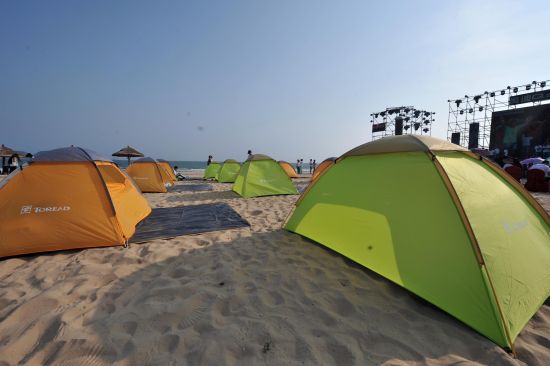Camping by the beach is a delightful experience, offering activities like sandcastle building and sunbathing. While beach camping is enjoyable, it’s crucial to be mindful of various aspects to ensure a pleasant experience. Here are some important considerations:

- Sunscreen Protection: Sunscreen is placed at the forefront due to its tendency to be overlooked. Many people spend a lot of time indoors, resulting in less sun-resistant skin. Exposure to beach sunlight for just two hours can lead to sunburn (or even less). Sunburn may not be immediately felt, and redness is a sign of sun damage. After a day or two, the skin may become painful, peel, or even blister. Cold compresses with a towel can help alleviate pain, and using moisturizers replenishes the sun-damaged skin with moisture. Additionally, replenishing vitamin C helps prevent melanin deposition. Individuals who frequently engage in outdoor activities have better resistance to sunburn. Consider using a sunshade with a silver coating or wearing long-sleeved clothing. Applying sunscreen is essential, and don’t forget to reapply after swimming or heavy sweating.
- Avoid Catching a Cold: One of the highlights of beach visits is playing in the clear seawater. However, be cautious, as playing in the sea can lead to catching a cold, especially during the transition from cold to warm weather. The sea may still be relatively cold, and those with weaker constitutions are prone to catching a cold. Once the seawater feels chilly, it’s advisable to leave the water promptly.
- Insect Prevention: Beach insects are as bothersome as those in the mountains. Apart from mosquitoes and flies, there are irritating sand fleas that bite, causing pain, especially in shallow water. Use insect repellent to avoid bites, and ensure tents have mosquito nets. Protect food and utensils (preferably not placed on the ground) to minimize exposure to insects. Sitting around a bonfire typically helps avoid insect bites.
- Moisture Prevention: Try to set up your tent in a place far from the water’s edge to avoid tidal waves submerging the tent. This requires knowledge of tide times, and local fishermen can provide valuable information. The safest approach is to camp on dry sand. Choose good weather for your beach trip and keep an eye on the weather forecast for the next few days.
- Quality Sleep: If the beach sand is dry, it will be soft and comfortable to sleep on directly. In case the sand is damp, use a moisture-proof mat to ensure a comfortable sleep. Before sleeping, check for insects inside the tent and go to the toilet to prevent disturbances during the night. Additionally, despite the summer season, bring a warm piece of clothing as beach locations may experience significant temperature fluctuations.
- Food Considerations: Beachside barbecues and seafood cooking are enjoyable, but it’s essential to consume fresh ingredients. During low tides on the first and fifteenth days of the lunar calendar (or a couple of days before and after), you can catch clams, crabs, and other seafood. Boil these seafood items in water without seasoning for a delightful experience. When barbecuing, be mindful of ingredient freshness; for example, buns and meat skewers can quickly lose their taste in the hot summer weather. Ham sausages have a longer shelf life. Ensure thorough cooking to eliminate parasites from seafood.
- Swimming Safety: Swimming in the sea involves certain risks, such as underwater rocks, deep holes, and complex water currents. For those unfamiliar with the local hydrological conditions, it’s essential to gather information on the water situation and swim with companions. Using a lifebuoy is advisable for added safety.
These tips will contribute to a safer and more enjoyable beach camping experience.

